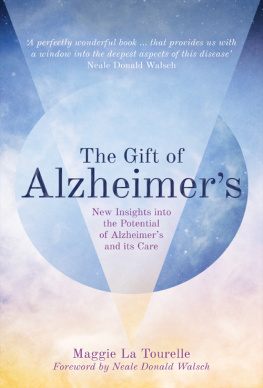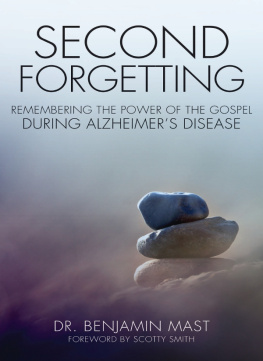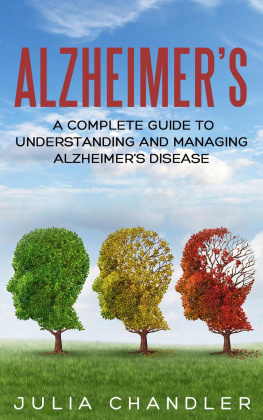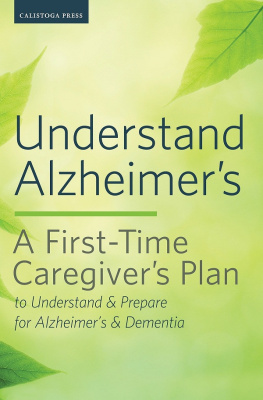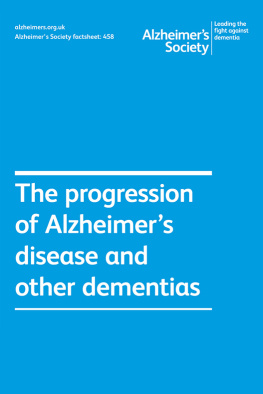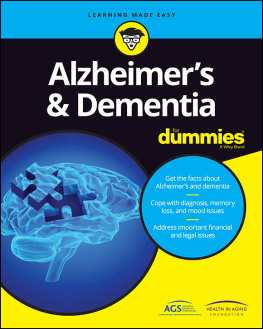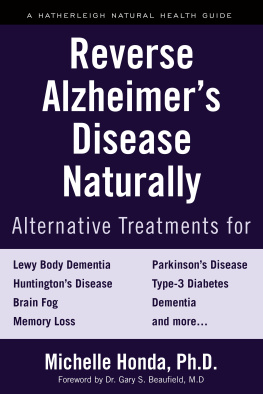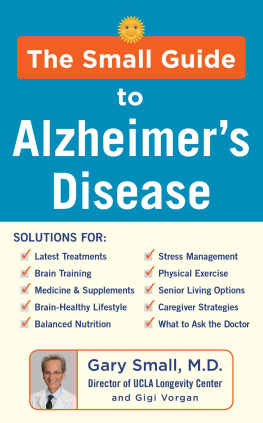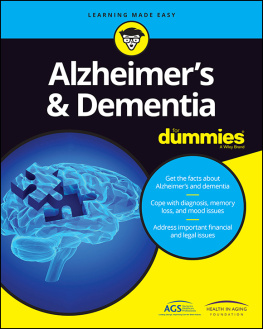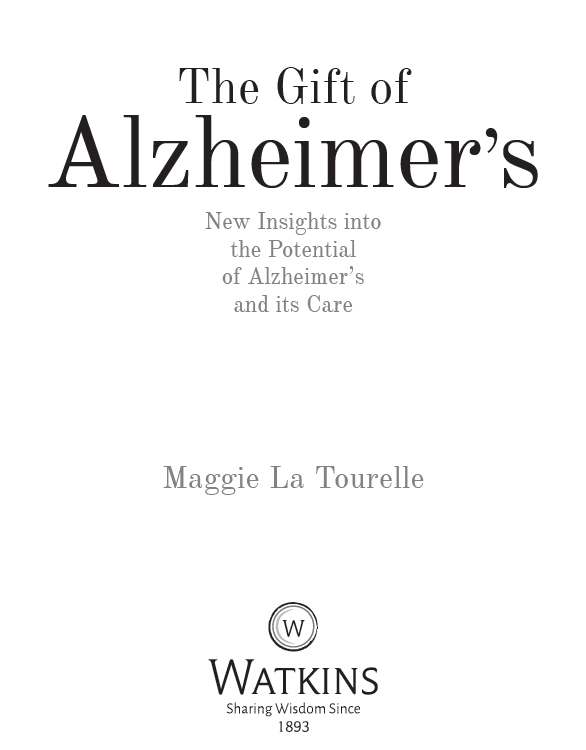
To my mother who gave me the gift of life,
and the gift of all gifts:
knowledge of life beyond.
CONTENTS
Foreword
You are holding in your hand a book thats perfectly wonderful if you know someone suffering from Alzheimers disease or if someone you know is dealing with such a person. If the second is true, you may want to pass this book to them the moment you finish reading it.
It is an extraordinarily challenging and deeply saddening experience to stand by and watch any beloved person encounter dementia and its particularly acute manifestation known as Alzheimers.
In this remarkable book, Maggie LaTourelle offers her first-person account of such an experience with her mother. Yet this is more much more than simply a look at what she and her mother went through. It is a strikingly impactful chronicle that provides us with a window into the deepest aspects of this disease, how it may affect some patients and how it can actually become a spiritual gift to both the person afflicted and to family caregivers.
Frequently, the books narrative surprises with totally unexpected insights and eye-opening glimpses into heretofore largely unexplored topics surrounding this disease such as, for instance, what its deeper spiritual implications might be.
Its real-world, but oh-so-gentle, this-is-how-it-actually-is narrative places us right in the middle of the kinds of moments that others walking a loved one through these disheartening corridors are surely going to encounter (if they have not already done so).
The effect of this book is that of having a soft-spoken and truly caring personal consultant in the conditions of memory loss standing at your side in your hour of greatest need, providing observations and commentary that it is highly unlikely any staff member at a care facility will ever offer you as you deal with a loved one suffering dementia.
The most hopeful of these insights is what the author describes as her personal experience: that as in-the-moment memory capacity diminishes in some dementia patients, extrasensory and psychic or paranormal abilities can often be enhanced.
Alzheimers patients very often present as being far more attuned to the emotions and energies of those around them than is assumed, and sometimes psychically intuit what others in the room are going through, or are mentally absorbed by, without a word having been said about it.
The point that the author makes is that patients are very often far more present than they may appear to be and that knowing and understanding this can lead to more profoundly enriching moments between loved ones than might have been thought possible in these circumstances.
I can neither vouch for nor confirm the authors ideas here, but they certainly do open the Alzheimers experience to a whole new level of possibility for patient, loving family and others.
As such, this book provides wonderful insights for those who may be feeling distraught or ill-equipped (or both) as they seek to meaningfully and lovingly engage with a person suffering acute memory loss and its accompanying functional disabilities.
Everyone who has had or is now going through this experience will thank Maggie La Tourelle for sharing this part of her life with such compassion, openness, understanding, generosity and love.
Neale Donald Walsch
Introduction
We are all living in Other Worlds.
Pat (my mum)
In the summer of 1997 I was walking along a beach on the west coast of Scotland, where my family lived, gazing out to sea with the wind blowing in my hair, when I was suddenly struck by the realization that in the next decade I would probably be facing the deaths of three of my closest family members: my sister, my mother and my father. This was a very bleak prospect, and I anticipated that I was going to have to cope with it on my own. I had a choice then to turn back and wait for it all to happen, or to continue on and prepare myself. And so began my journey of exploration into what many consider to be a taboo subject: death. I attended workshops and seminars, read books and contemplated this passage, one of the greatest of lifes mysteries.
As a holistic therapist, I had an interest in all aspects of health and wellbeing and, living and working in London, had access to the information I sought. In 1999, my younger sister, who had been unwell for many years, died suddenly from an alcohol-related illness. A year later, my mother, aged eighty-five, was diagnosed with Alzheimers disease, a condition that some would call a living death. By this time, both my parents were sorely in need of practical and emotional support and, being their only remaining daughter, I decided to make them my priority and support them to the end of their lives. I adjusted my life to accommodate these changed circumstances and so a new era began. I had no idea where it would lead me and hardly dared to think about what might be looming on the not-too-distant horizon.
I am aware that the title of this book, The Gift of Alzheimers, is a challenging and controversial one but my mothers Alzheimers did turn out to be a wonderful gift to both her and me. Our story shows the potential there can be in late-stage Alzheimers, and by sharing it I hope others can learn how to transform their experience of this devastating disease in similar ways.
Before we embark on this very personal journey, it is important to place my mothers and my experience within the wider context of Alzheimers disease and dementia. There are said to be over a hundred types of dementia, of which Alzheimers disease is one. It does, however, account for 60 to 80 per cent of all dementias and is the most feared. Like any family would be, we were very distressed when we received the news in the year 2000 that my mother had been diagnosed with Alzheimers, for which there is as yet no cure.
Alzheimers disease has been defined as having seven stages (see pages ). Our Heart and Soul Journey starts when my mother was at Stage 6, moderately severe, and continues to Stage 7, severe, and to the end of her life. Alzheimers is a neurodegenerative disorder causing damage to the brain that results in a plethora of neurological and physical disabilities, from forgetfulness, anxiety and an inability to manage complex life tasks in the earlier stages to rigidity, immobility and impaired or lost speech as the disease progresses. My mother experienced all these limitations and losses, but to our surprise and amazement she and I discovered that her Alzheimers also provided us with a new opportunity, one we had not expected.
So what made this journey of discovery possible for us? As well as being my mothers caring daughter I am a holistic therapist, so I was able to bring my professional skills and expertise to the situation. My work addresses the whole person: the physical, emotional and energetic aspects. When doing psychological therapy, counselling and psychotherapy, I use a person-centred approach combined with Neuro-Linguistic Programming (NLP). I integrate this with a holistic system called kinesiology that uses muscle testing to communicate directly with the body and a range of healing treatments. I also do energy healing that works purely on the persons energy fields. I discovered that by employing these I was able to open up new channels in communication and wellbeing for my mother that had not been considered before or even thought to be possible. This may sound like the preserve of the professional but it isnt anyone can help a loved one suffering from Alzheimers and I provide information and simple guidelines on how to do this in the chapter A Positive Way Forward. So this book offers a whole new way of approaching late-stage Alzheimers. Through the mediums of dialogue between my mother and I, and my own commentary, it brings new understanding of the disease and will be helpful to all those involved with people who have Alzheimers: family, friends, health-care professionals and educators.
Next page
